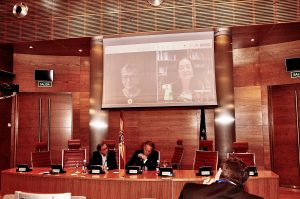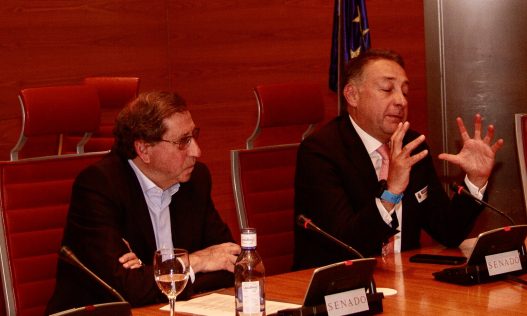
FOR THE JOURNALIST, THE GOAL IS NOT TO BECOME AN INFLUENCER, BUT TO BECOME CLOSE TO THE MEDIA
There are even those who use the hybrid term ‘journalinfluencer’ to refer to cases of journalists who have chosen to use the communication format of youtubers, instagramers, tiktokers… What can journalism rescue from these new forms of connection between a sender and thousands, millions, of receivers? What limits should be marked between one and another communication practice? And, furthermore, is the influencer technique the only way to get closer to the public?
These and other questions were debated in the panel ‘Citizen participation and the media’. It was one of the eight forums that took place at the Congress of Media Editors of the European Union, Latin America and the Caribbean, held from March 18 to 21, 2024 in Madrid and Brussels.
The panel took place on March 19, at the Spanish Senate, in the center of Madrid. In this video of Canal Europa you can see a summary of the activities of that day.
The moderator of the meeting was Fernando Quijano, general director of the Colombian newspaper La República. The speakers were Luis Ayllón, director of The Diplomat in Spain; Magdalena Trillo, professor at the University of Granada and Digital Transformation advisor for Grupo Joly, and Liza Gross, senior advisor for the Solutions Journalism Network (SNJ).
THE WAY TO ENGAGE HAS CHANGED
“What there were were letters to the editor,” recalled Luis Ayllón. That was the most common way in which the public participated, in which they expressed their opinion on what a media outlet published or, in general, on issues of collective interest. Letters that had to go in a fixed, limited space.
This latent interest in participating found new spaces and new forms of expression with the advent of social networks, where everything fits. But there were those who knew how to specialize in these new forms of communication to comment on and talk about topics of interest to specific groups. Influencers were born, specialized communicators (professional or not) with loyal followers.
“From the new technological platforms,” said Ayllón, “new opinion leaders have emerged, who are not in the press media; this represents a great change in the way citizens participate”.
WHAT CAN JOURNALISTS LEARN FROM INFLUENCERS?
Professor and journalist Magdalena Trillo began with a suggestive question: “Those old letters to the editor, were they answered?
In the affirmative or negative answer lies, in fact, the heart of the matter, because, Trillo explained, it is not so much about the mechanism used but about how willing a media outlet is to connect with the public.
For if there is one thing journalism should learn from influencers, it is their ability to get closer to the audience.
“You have to understand that citizens are active people. They are readers who have found other opinion leaders outside the press media, opinion leaders whose main characteristic is that they speak the same language as the public and use the same technologies,” explained Trillo.
The specialist also said that the media, in many cases, have remained in the same thematic circle, the traditional one, that of politics for politicians, to generalize. Influencers, on the other hand, deal with topics of direct interest to the public. “People need to be told what is going on; the problem for the press that does not take this need into account is that its intermediary power falters. That is, its very reason for existence falters.
It is the era of influence, says Trillo. “We are in the era of the battle for people’s attention.” How to win that battle? The strategies could be summarized as follows: address issues of real interest to the public; explain in a close and rigorous way the issues of national interest; use the same language and the same technologies as the public.
And one more issue: allow the public to also participate in the formulation of the issues. On this crucial point, Liza Gross added a challenging element: that the public should not only help formulate issues, but also participate in them.
THE JOURNALISM OF SOLUTIONS
There is a kind of existential crisis for journalists, said Gross. Communicators are asking themselves what their role is today: should they become frivolous in the topics they deal with and in the way they approach them, is that journalism, is that reconstructing their role as mediators, and what is really needed is for the journalist (and the media) to have the capacity to adapt, not only in terms of technologies, but also in terms of the media.
For Gross, what is really needed is for the journalist (and the media) to have an adaptive capacity, not only in terms of current technologies and communication styles, but also in terms of thinking, valuing and approaching the topics they publish. In this context, the proposal of the so-called Solutions Journalism arises.
“Solutions Journalism is a line of work (with many examples, especially in the U.S.) that is dedicated to rigorous journalistic coverage of the answers given to social problems that are important to the community. It is about dedicating journalistic efforts to delve into the responses that those involved have given or are giving to that problem, to see if they have produced results and to follow up.
This is a different and profound way of creating dialogues with the audience, Gross remarked. Because the journalist does not stop at describing the problem. By addressing whether the solutions have worked or not, he avoids a depressive narrative because, even if the solutions have not been effective, by following up he maintains a hopeful vision.
In Solutions Journalism, moreover, the public participates in the creation of that narrative, it speaks for itself. It does not replace the journalist, but shares the narrative with him. It can also share the research, for example, by providing the journalist with documentation and information that the communicator will then have to process professionally.
Gross said that this is a line of work that is already being practiced by thousands of journalists around the world, especially in local environments. On the Solutions Journalism Network website you can review these examples and contact this organization that encourages this way of communication. “There are perfectly reproducible cases in Latin America and Europe, but the key is that journalists want to do it, want to work closer to the community”.
Yes, that journalists want to, but that the media in which they work value the importance of the local, stressed Magdalena Trillo.
“We are clear that people are looking for topics that are close to them, that affect them directly; that is why local journalism is very important and, from this perspective, it can be one of the pillars of economic sustainability of media companies,” Trillo concluded.
ABOUT THE CONGRESS OF EDITORS
The VII Congress of Media Editors of the European Union, Latin America and the Caribbean is an event organized by Grupo Prestomedia with the support of EditoRed, the European Commission and the European Parliament, Telefónica, Iberia and the Community of Madrid, as well as the collaboration of Universidad Rey Juan Carlos, Turismo de Galicia and Casa de América, and with Prensamedia as editorial partner.
This year, the general theme of the Congress was: “The quality of information and the credibility of the media, guarantees for democracy”. The meeting took place on March 18-19, 2024 in Madrid, Spain, and on March 20-21 in Brussels, Belgium.
————
This text is free to use. If you use it, please cite EditoRed.



